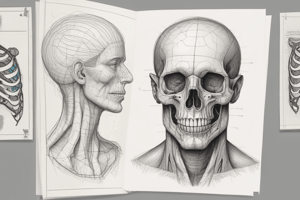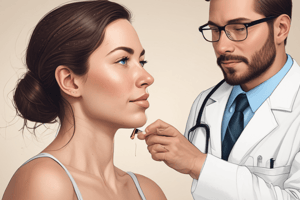Podcast
Questions and Answers
What percentage of medical students is likely to recognize burnout as a risk during their education?
What percentage of medical students is likely to recognize burnout as a risk during their education?
- 60% (correct)
- 80% (correct)
- 20% (correct)
- 40% (correct)
Which of the following is NOT commonly cited as a long-term effect of burnout experienced during medical school?
Which of the following is NOT commonly cited as a long-term effect of burnout experienced during medical school?
- Mental health disorders
- Chronic stress-related health issues
- Increased job satisfaction (correct)
- Decreased academic performance
Which strategy is least likely to be effective in preventing burnout among medical students?
Which strategy is least likely to be effective in preventing burnout among medical students?
- Isolating oneself during stressful periods (correct)
- Developing a strong peer support system
- Engaging in regular physical activity
- Practicing mindfulness and self-care
Which peer support program element is considered most crucial for preventing burnout?
Which peer support program element is considered most crucial for preventing burnout?
Which of the following is a common misconception about coping with burnout?
Which of the following is a common misconception about coping with burnout?
What is a common nationwide measure proposed to combat medical student burnout?
What is a common nationwide measure proposed to combat medical student burnout?
Which personal habit is least likely to contribute positively towards burnout prevention?
Which personal habit is least likely to contribute positively towards burnout prevention?
How should medical schools ideally address issues of student burnout?
How should medical schools ideally address issues of student burnout?
Which factor is most likely to increase confidence in managing future episodes of burnout?
Which factor is most likely to increase confidence in managing future episodes of burnout?
What aspect of medical school is least associated with causing burnout?
What aspect of medical school is least associated with causing burnout?
Flashcards are hidden until you start studying
Study Notes
Demographic Questions
- Age, gender (male, female, other), year in medical education, and country of study are key demographics for understanding burnout.
Burnout Experience
- Stress level as a medical student rated on a scale of 1 to 10.
- Burnout experienced by some students, often indicated by year of studies when it was first noticed.
Burnout Symptoms
- Symptoms reported include emotional exhaustion, depersonalization, reduced personal accomplishment, physical fatigue, insomnia, anxiety, and depression.
- Frequency of feeling overwhelmed by studies varies among students.
Impact of Burnout
- Burnout has potential negative effects on academic performance, personal relationships, and career perspective.
Coping Mechanisms
- Common strategies for managing stress include regular exercise, meditation, counseling, time management, and socializing.
- Effectiveness of these strategies ranges from very effective to not effective at all.
Institutional Support
- Medical schools may provide resources for stress management.
- Student satisfaction with support resources varies, indicating differing levels of institutional effectiveness.
Prevention Strategies
- Additional support or resources may be beneficial to prevent burnout in medical students.
- Importance placed on medical schools' proactive efforts to combat student burnout is acknowledged.
Further on Burnout Experience
- Stigma associated with burnout affects willingness to seek help.
- Risk of burnout peaks at certain times in medical education, with varying discussions on the topic among peers.
Personal Impact
- Burnout diminishes motivation for studying, affecting academic performance and physical health.
- Consideration of dropping out due to burnout and its influence on specialty choice is significant.
Support Systems
- Support sought from family, friends, faculty, and medical professionals; responsiveness differs among mentors.
- Barriers to seeking help can hinder recovery from burnout.
Prevention and Awareness
- Perception of education about burnout risks and signs varies.
- Interest in peer support programs for burnout prevention exists among students.
Looking Forward
- Long-term effects of burnout during medical school could have implications for future career performance and mental health.
- Personal strategies to combat burnout may include effective habits; confidence in managing future burnout episodes varies widely.
- Discussion on necessary measures at national or international levels to tackle burnout includes seeking broader systemic changes.
Studying That Suits You
Use AI to generate personalized quizzes and flashcards to suit your learning preferences.




